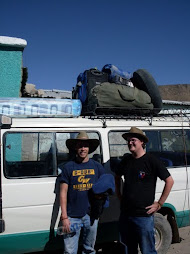
Wow, that last post has been hanging up there for awhile. I promised a more optimistic blog this time out, and here it is. Things really haven’t changed in site, but I’ve got a couple of interesting new projects to hope after and something may even come of one of them. First off, we have a new environmental plan in place that may get some of the projects I had proposed off to a start. I also finally tracked down some seeds courtesy of another volunteer in the canyon to start a garden with the health post for the old folks club. Lastly, Salvador and I, another canyon volunteer, may get to do a business video project that would entail some traveling and fancy camerawork.
So, on to the broader strokes. For one, I don’t want the last post to be interpreted that what the Peace Corps does is ineffectual or unnecessary. There are at least six NGOs working in the Canyon from three different countries and I am convinced that Peace Corps has a better development philosophy than any of them. The core of the difference is that PC volunteers actually live in the towns where they try to make a difference. Most NGOs come to town, give a talk about a subject, and head on out. Some turn this talk into a series and even start organizations that are supposed to do a particular task, such as make artisan goods or promote tourism. The problem is that there is little to no follow-up and not living in the town means that the NGOs have a tough time diagnosing what the problem is if something goes wrong. By living for two years in the same town PC has a lot better chance at producing truly sustainable projects.
The second problem with most NGOs is the way they hand out money and resources. The simple action of giving to people isn’t bad in itself, but do it enough and you produce a culture of expectation. One of the first questions I got when I got to site was what I was going to give people. My answer of two years of my time didn’t seem to impress them much. I recently had a conversation with a teacher at my high school where I mentioned the saying where you can either give a man a fish to sustain him for a day or teach him to fish to sustain him for a lifetime. The teacher said that most Peruvians would just take the fish, and I think that would be true of people most anywhere, especially if they’re used to being given handouts. Sounds almost Republican, I know, except that I’m not sure they’re particularly interested in the teaching to fish part either.
So, I have no idea how to solve the world’s problems, but I think that we could do a lot worse than the PC approach. I’m certain that the common philosophy of just giving handouts isn’t working and won’t work. Ways need to be found to change people’s basic outlook. The most probable methods to find success would be to change basic circumstances through universal access to education and improving basic living standards with basic infrastructure projects (3 “basics” in one sentence… and I want to write for a living…). If we stopped giving billions to third world despots or wasting them through projects that treat the symptoms instead of the disease, we might even be able to do it.
